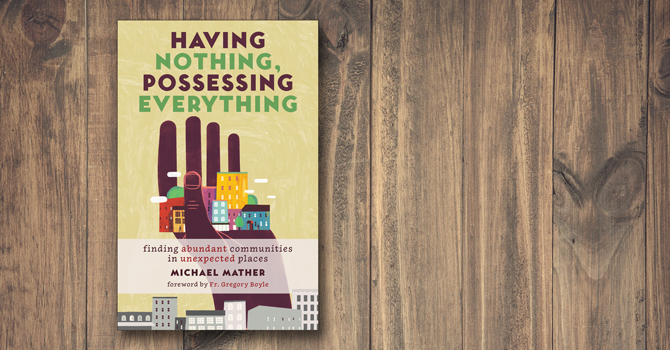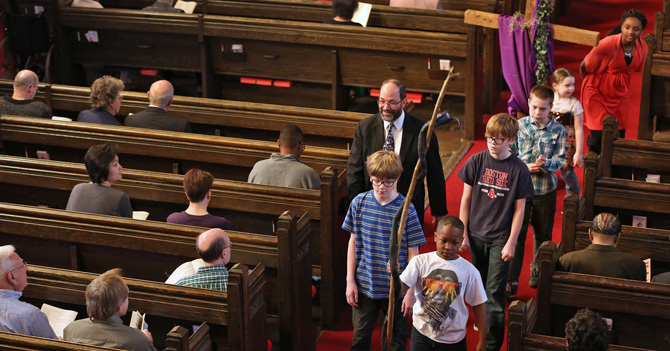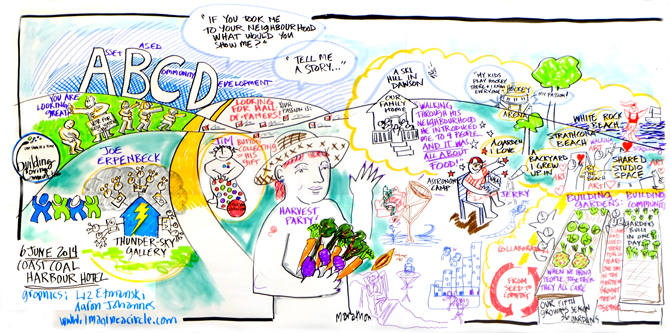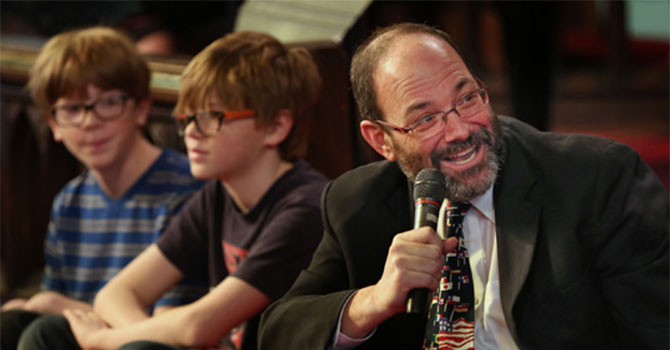The Rev. Michael Mather began ministry seeing only the needs and the scarcity in the communities he served; gradually, however, he learned to see the riches, power and abundance of even the most materially poor.
In his new book, “Having Nothing, Possessing Everything: Finding Abundant Communities in Unexpected Places,” Mather, the pastor of Broadway United Methodist Church in Indianapolis, tells the story of his vocational journey as a pastor working in low-income parishes.
Money, Money, Money
I had learned my lessons well. Poverty was about making bad decisions and having a lousy education; it was about early pregnancy and drug addiction; it was about mental health and family structure. Sure, injustice was a part of it. I just wasn’t sure how. But if I ran programs that made the givers feel good and that the poor showed up for, I must be on the right track.
I’d missed the simple point that being poor means you don’t have money.
I’ve worked in low-income communities in New Jersey and Indiana. In each place, we established a wide range of programs and services. In each we provided summer programs for young people that included art, history, music, Bible study, poetry, math, and more. We provided a wealth of services and opportunities, but not money. Because, I thought to myself, It isn’t about money. I thought it was about all the other things missing in the lives of the poor.
While in South Bend, I got invited to a press conference at the St. Joseph County Health Department, which was releasing the results of a five-year study. It reported that people who don’t have money are less healthy than people who have money. All but two of the people in the room were health-care professionals. They offered different ideas about programs their institutions could provide to improve the health of people who don’t have much money -- even though that wasn’t the point of the study. And then they proposed programs through which they paid themselves to deliver services to poor people.
At least one of the proposals should have focused on finding a way for poor people to get more money. The issues raised by this study and the attendees’ tone-deaf response to it challenged me more than any situation I had struggled with before. I could hear my mother say to me (as she did so often), “Just use a little common sense, Mike.” Common sense would say: Find ways to get money into the hands of those who don’t have much of it.
The lack of money was the biggest challenge I dealt with daily as people stopped by to request help from me in the church office. They didn’t have enough money to prevent themselves from being evicted from a home, having their gas or lights turned off, or having no affordable transportation.
The lack of money isn’t determinative, but it’s very powerful. People in the charter school movement often say, “Poverty isn’t destiny.” They’re right. But back in the 1930s, ’40s, and ’50s, people would say, “Segregation isn’t destiny.” They were right, too. You could point to Mary McLeod Bethune, Martin Luther King Jr., and Paul Robeson -- a few among many others who rose from the prison of segregation. But most who lived under segregation were held in check by it.
Segregation legally locked out black and brown people from access to jobs, services, citizenship, and equal education. Poverty locks people out of opportunity. Studies show that as a group, people with less money find in every way that their futures are more limited than those of people with more money. The single most determinative factor affecting high school graduation rates, health, and employment is economic status (income and net worth). And most efforts to “help” those in poverty have very little impact on this most powerful of factors.
When I helped someone with their rent or utility bills, I staved off for a month or two the eviction or the loss of access to the service. That’s not nothing -- but it’s palliative rather than healing. And those who consider themselves “helpers” often become resentful that people aren’t changing and “getting better.” For decades I sat in meetings where people running food pantries talked non-stop about those receiving food as untrustworthy or worse. Those discussions both reflect and shape the perspective of the “helpers,” making it nearly impossible for them to see the gifts of the people they’re trying to help.
Some clergy and laity from an inner-city church in the Midwest visited us recently. These leaders explained how their congregation offered “giveaways” -- but then complained that many of the people who came to them “took too much.” I asked how that could be, since I was pretty sure that people weren’t taking more than they were being given. They weren’t. But the volunteers and the staff at the church still felt like people were taking more than they needed. And they resented those who received their charity.
Our church and community began asking ourselves a set of new questions. For instance, we asked how we could use money to reveal the power and abundance we witnessed in others. We began to notice a subtle shift that moved us from asking how we could help to how we could become venture capitalists. Where could we invest our money in this neighbor? What services or products that these gifted entrepreneurs offered could we multiply by helping them share their paintings, poetry, fishing talent, jewelry, carpentry, and more?
In faith communities, we’re often more interested in helping people than in seeing equality achieved. We’re more interested in seeing ourselves as the helping ones than in re-ordering the social order so that there are fewer people desperate for help.
We knew our neighbors still needed money to pay their bills, but we would now focus on the talents and gifts each person had to offer, and how those gifts could help them get more money. When a neighbor stopped by to ask for assistance in paying for school expenses for the grandsons she was raising, she was carrying a beautifully handcrafted purse. A church member noticed and asked where she got it. She said that she had made it, and went on to describe in intricate detail the craft of purse-making. When we asked if she had any more, she brought us three she had made; we paid her for them and used them as gifts for a church fundraiser. What she had to offer made other people happy, and it made her happy. And it made her money.
As we focused more and more on the gifts of people around us, we stopped collecting money for emergency assistance. We created a new account and called it “The Abundance Fund.” We don’t use money from this fund to pay utility or rent bills. We use The Abundance Fund to pay people to share their gifts with others.
When people request emergency assistance, they’re taken aback when we tell them we can’t pay their bill. But when we ask if they’re willing to have a conversation, no one ever says “No.” We ask what they care about. We ask what they do when no one else is watching, when they’re doing something they don’t have to do. We ask what others say about them. What do the people who love them say they’re best at? If it’s something practical -- if they make a product or provide a service -- we offer to try it and pay them for it.
We use this as an opportunity to build community and to reveal the abundance of community through the investment of our money. When we give money to people who have shared this gift with us, we encourage their sharing that gift with others. Because we invest in them, we both see and remember what they have to offer.
As we changed our response to people’s requests for help, we began to notice other changes. We noticed a shift in how people felt as they left the church offices. When we were paying people’s bills, they often left with the same posture with which they arrived. Head down. Spirits down. Now people often leave smiling, even though they still have no money in their pockets. The change has been astonishing.
One of the first people who came to us as we were changing our questions told us she was a good baker and that she made great cookies. So we bought some from her, and they were delicious. Based on our tasting experience, we asked her to make some for a neighbor who was ill and who loved cookies. We offered to pay her to make the cookies, take the cookies to her neighbor, and visit with her. Paying the baker for her work was the point, and getting two neighbors to meet and share together was the point. The “helpers” of the church didn’t have to put themselves in the center of this “assistance.” The baker never mentioned our encouragement of her, or our paying her, and that was perfect.
Next a singer came into the church’s office. She loved an audience. Where could she find one? Every afternoon when the bus dropped students off at a corner near her home, the bus stop was packed. So she stood in an empty lot near the stop and began to sing, and we paid her for it. The young women and men, who included her sons, turned and stared. But soon they were clapping, and some joined her in song. When she told us the story, she leaned back and laughed. A couple of years later, she sang “His Eye Is on the Sparrow” at the funeral of a family member of one of those young people who met her at the bus stop. Since then, the funeral home has hired her to sing for more funerals.
Another woman made clothes for children. By showing other church members and neighbors some examples of her work, we expanded her customer base. We also met a man who was a good auto mechanic, and we directed church members and neighbors who needed car repair to him.
It often takes a while to really discover people’s gifts. That was true for us, because when we first started asking people what they were good at, they didn’t believe we really wanted to know. Some believed they still needed to tell us the best story about how bad things were -- the worse, the better. Now the script was flipped; we were asking for a different story. And different stories emerged. Slowly at first, but then they began pouring out.
And the gifts that we discovered multiplied. We were pleased to see that neighbors reached out to each other more often. And neighbors who used the gifts of other neighbors began to see the abundance that was both around them and within themselves. Also, when people from outside the neighborhood went “inside” and hired someone to cook a meal, or bought a piece of art, or got their nails done, they began to see ostensibly needy people as artists, economists, musicians, chefs, and entrepreneurs.
Excerpted from “Having Nothing, Possessing Everything: Finding Abundant Communities in Unexpected Places,” by Michael Mather (Eerdmans, 2018). Used with permission.











